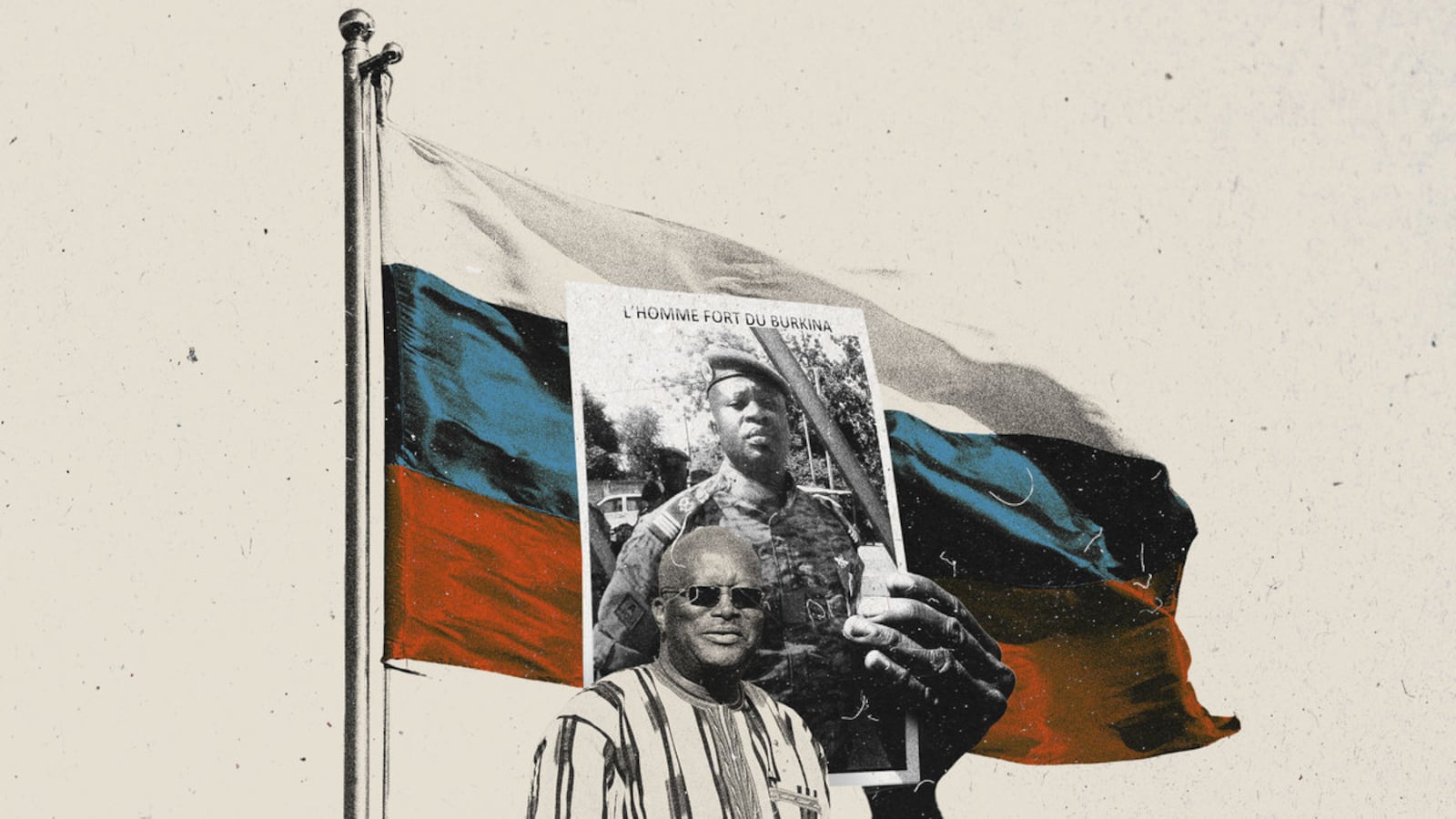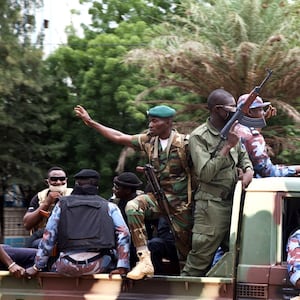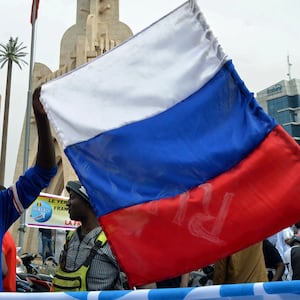ABUJA, Nigeria—One of the Burkina Faso president’s final acts in office was refusing to sanction the use of Russian paramilitaries on his soil.
The leader of this week’s successful military coup against him was the very man who tried to pressure him into accepting help from Moscow, sources in the former president’s camp told The Daily Beast.
Paul-Henri Sandaogo Damiba, a lieutenant colonel, was promoted last month to oversee security in the capital city of Ouagadougou. On two occasions he sought to persuade President Roch Kabore to engage Russia’s black ops outfit the Wagner Group, according to two officials who were part of the president's communications team.
Damiba was appointed as commander of Burkina Faso's third military region in December, a unit responsible for security in the capital and in the east of the country, following an attack by Islamist militants that killed 49 military officers and four civilians. The incident sparked anti-government protests and calls for Kabore to step down.
This month, Damiba held a meeting with the president and implored him to bring in the Wagner Group to bring the fighting under control. The notoriously secretive Russian paramilitary company was first identified in 2014 fighting alongside pro-Russian separatists in the conflict in eastern Ukraine, but it has since spread to Africa where it has been hired by struggling governments to help fight jihadists.
“The president quickly rejected the idea and even reminded Damiba that European governments had just condemned the deployment of Russian mercenaries in Mali by its military leaders,” one of the officials told The Daily Beast. “Kabore didn't want to run into any problems with the West for aligning with Russia.”
Sixteen countries, including France, the United Kingdom, Italy, and Germany, said on Dec. 23 that they were aware of “the involvement of the Russian Federation government in providing material support to the deployment of the Wagner group in Mali” and demanded that Russia “revert to a responsible and constructive behavior in the region.”
That warning did not stop Damiba from seeking to have the group, which has also been deployed in Libya and the Central African Republic, on the ground in Burkina Faso.
“He reached out to the president a second time regarding hiring the Russians,” the official said. “Again, the president rejected the idea.”
Sources say it was the last time 41-year-old Damiba communicated with Kabore.
Weeks later, the lieutenant colonel dressed in military fatigues and wearing a red beret, appeared on national television sitting to the right of an army captain who read a statement announcing the overthrow of the Kabore government and the suspension of the Burkina Faso constitution.
The coup plotters said they were part of a previously unheard of group called the Patriotic Movement for Safeguard and Restoration, “which includes all sections of the army.” The announcement followed two days of chaos in Ouagadougou, with soldiers firing shots in the air and demanding support for their fight against insurgents.
Kabore—in power since 2015 and re-elected in 2020—has been unable to deal with a jihadi insurgency in Burkina Faso’s north and east regions unleashed by groups linked to al Qaeda and the so-called Islamic State. In the last six years, around 1,500 people have been killed and nearly 1.5 million have been forced to flee their homes, with many blaming the growing violence on Kabore's lack of leadership
Former aides to the president told The Daily Beast that the president had been warned that promoting Damiba might be dangerous.
According to another official in Kabore's communications team, close friends of the toppled president had expressed concern about Damiba's appointment because they thought he had close ties with army colonels Assimi Goita and Mamady Doumbouya, the military rulers of Mali and Guinea respectively, both of whom seized power from civilians leaders in their countries last year.
Sources say Kabore dismissed those fears, claiming that Damiba was a dedicated officer who could help him shore up support within the army. Damiba is said to have spent time with Goita and Doumbouya in 2019 when both men participated in a U.S.-led military exercise known as Flintlock in Burkina Faso and has remained close to them since then.
“The government was aware that he [Damiba] has a close relationship with the military leaders of Mali and Guinea, and has been in regular contact with them,” a former official said. “In fact, we believed at the time that the leader of Mali, who is cozying up to Russia, was the one who spoke to him about bringing Russian mercenaries to Burkina Faso.”
Like Damiba, Goita and Doumbouya were born in the 1980s and were relatively unknown at the time they forcefully took control of the government in their respective countries.
Goita, 39, emerged on Aug. 18, 2020, when he joined with Russian-trained Malick Diaw and Sadio Camara—both army colonels—in launching a coup against elected President Ibrahim Boubacar Keita, following weeks of mass protests over perceived corruption.
A month later, he set up a transitional government with himself as vice president, but he seized power last May after accusing the president of failing to consult him regarding a cabinet reshuffle.
The Wagner Group has taken an increasingly prominent role in the country.
Doumbouya, 41, for his part, masterminded the September 5, 2021 coup that ousted Guinea's 83-year-old President Alpha Condé, who had backed a new constitution that paved way for him to run for a third term in October 2020. The president’s controversial move triggered mass demonstrations in which dozens of protesters were killed. His relationship with Damiba reportedly dates back to 2017 when both men attended training at the famous École Militaire in Paris.
Whether or not Damiba, who authored a book published last June titled West African Armies and Terrorism: Uncertain Responses, got advice or inspiration from his fellow coup plotters before seizing power in Burkina Faso remains unknown.
The new leadership has promised to bring back “constitutional order” within a “reasonable time” but has remained silent on the whereabouts of the man they overthrew.
How long before the Russians arrive?








